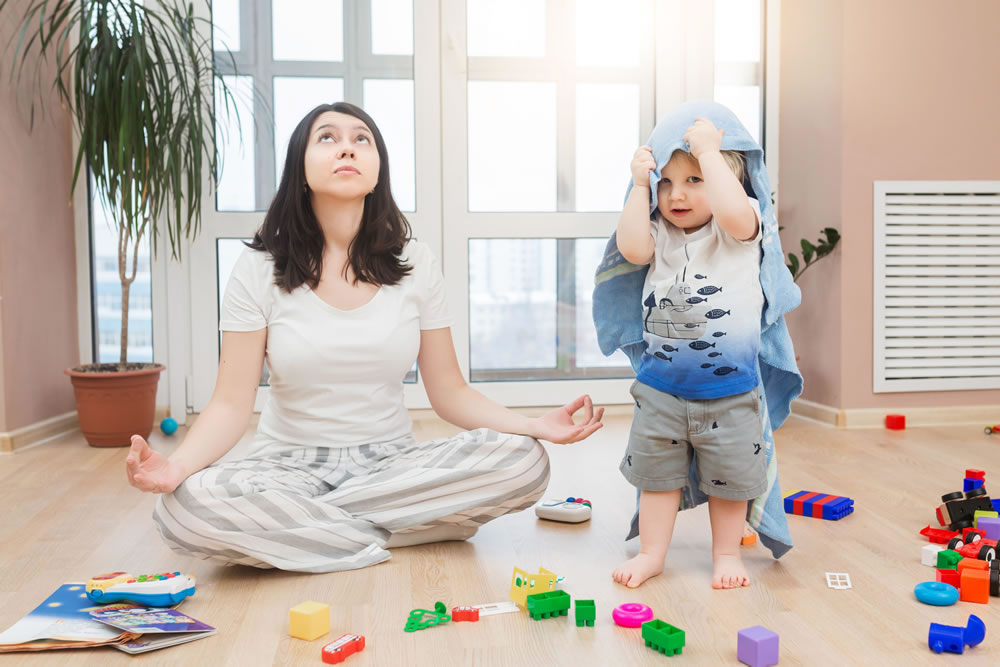
Nothing. Really. You notice what you're feeling, you breathe your way through it, and you DO nothing.
When our temper rises, we all feel an urgent need to DO something, anything. But that's our emergency response system operating. And parenting, despite how it feels, is not usually an emergency.
So the most effective thing you can do is restore yourself to calm before you act. Why? Because the rational brain stops working when you're angry. So when you act from anger or fear, you're never taking constructive action.
Mindfulness simply means being present with -- noticing -- our own feelings and thoughts without acting on them. Meditation teacher Sharon Salzberg says it more directly: "Mindfulness is not hitting someone in the mouth."
Sure, when we feel our temper rising, it feels like we MUST intervene at that moment. Otherwise, our child will "get away with" bad behavior. And they'll become a terrible person!
But that's fear speaking, and it drives us to take actions that make things worse. Later, we realize that we let our emotions run amok. We didn't guide our child with love. We didn't help her WANT to be a more responsible or cooperative person. We didn't take responsibility to manage our anger responsibly. Instead, we dumped those yucky feelings from our full emotional backpack onto our own child. Sure, the child was not cooperating at that moment. But is that what we want to model?
So what can you actually DO when you feel your temper rising?
1. Notice that you're starting to get swept into "fight or flight." It might be an exasperated sigh, your voice getting louder, or your jaw clenching. Or maybe your mind starts churning with irritated thoughts. Once you notice your "temper rising" you've given yourself a heads-up that trouble's brewing, and you have a choice about how to respond.
Yes, noticing those little upsets before you get hijacked by your anger is hard. But it gets easier when you practice -- you're actually rewiring your brain to slow down that quick leap to anger. Luckily, we each have multiple opportunities to practice noticing our irritation rising, every day! (And here you thought that was a bad thing.)
2. Stop, Drop (your agenda, just for now), and Breathe. If there's no physical intervention absolutely required, just hold still and breathe deeply. Even if you do need to move toward your child to stop him from hitting the dog or throwing his toy, breathe deeply! This interrupts the stress hormones flooding your body. It makes you aware of all those sensations of anger, so you don't go on auto-pilot and start raging. Think of "Stop, Drop and Breathe" as your enhanced PAUSE button.
3. RESIST taking action. Just breathe and tolerate the feelings until they pass. I guarantee you those feelings will feel awful. You'll feel like lashing out (fight), running away (flight), or numbing yourself with food or a screen (freeze). You might feel like you can't breathe, or even like throwing up. But if you keep breathing into those sensations in your body, the feelings will pass. If it feels too hard, wrap your arms around your body and flood yourself with love. (Yes, it's corny, but it works.)
Can you do this every time you're angry? Not unless you're a saint. But every time you do manage it, you're emptying your emotional backpack of old baggage -- rewiring your brain -- so you're less likely to get hijacked by anger the next time. And you're modeling responsible anger management and emotional intelligence for your child.
4. Work hard to see things from your child's point of view. If you're sure you're right and the other person's wrong, you're already moving into fight mode, where your child looks like the enemy. So notice those thoughts that say your child is choosing to give you a hard time. If you don't catch them, you'll blow up sooner or later. Re-frame to something that's actually more true: "She's having a hard time; she needs my help."
5. Choose love. Every action we take can ultimately be seen as a choice between love and fear. (Fear is always lurking behind your anger.) Once you free yourself from that leap to "fight or flight" you can do what we always tell our children: Make a better choice.
You'll know, in the moment, what that means. Maybe you:
- Set a limit, but set it with empathy. ("You wish you could....I know it's hard when....")
- Summon up all your compassion so your angry child feels safe enough to drop the shield of anger and soften into the tears or fears behind the anger.
- Move into playful mode to let your child save face.
- Listen to why your child is so upset.
- Hold out your arms for a hug.
Should you teach? Sure, once you're calm, and your child is calm. You'll be able to listen to your child and empathize. But until you're calm, don't try to teach, or you'll be inadvertently teaching the wrong lessons. The lesson you really want to teach is how to self-regulate, how to state your own needs without attacking the other person, how to find compassion for yourself and your loved one when you disagree, how to connect, apologize, start over. How to choose love.
Your child is defiant.
Your child is whining.
Your child is tantrumming.
Your child forgets something, again.
Your child isn't listening to you.
Your child clobbers your other child.
Can you choose love?





